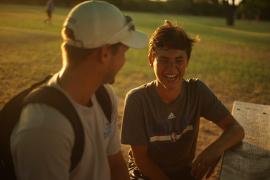A few years ago, my husband and I took our four children to a fun little water park and resort with all sorts of family activities to do together. At the ripe old age of 40, I came to a rather shocking realization: I don’t actually enjoy ropes courses. In fact, I pretty much hate them. So why in the world do I have these bright and shiny memories of doing ropes courses at camp?
If I dramatically squish my face up (this is super helpful in remembering things), my memory becomes a little clearer. Little camper Amanda had tears in her eyes, shaking legs, quietly saying over and over that she couldn’t do it. But below me on the ground, my counselor and cabinmates clapped and cheered me on with such enthusiasm! Their voices filled me with the courage to climb all the way up the awkwardly spaced metal pegs to the first platform, where an energetic counselor gave me a huge high five. On the other end of the two, long, parallel metal cables, yet another smiling counselor made eye contact and kept up a continual stream of encouraging words. I can imagine what they said, though I don’t really remember it. “You can do this, Amanda! I’m right here. Just a few more steps and I’ll grab you. You’re not going to fall. Trust the harness. You’re going to be so proud of yourself! Don’t forget the zipline at the end!”
And I did make it to that next tree platform. I made it to the next and the next — and each time found another counselor harnessed in, ready to secure my carabiner to the next element. Did my limbs stop shaking? Absolutely not. Did my tears and fears continue? They definitely did. So why did I keep going all the way to the bottom of the zipline? Because of you, the incredible camp counselor at the top of the ladder or on the other end of the next terrifying high ropes element. Because of you, the counselor on the ground reminding my cabin mates to make sure to cheer on the kids like me who were terrified.
I had already been researching summer camps for a couple years when I made this realization about ropes courses, and it was a powerful lesson to me about support, community, and the influence of seasonal staff members. My children’s experiences of this indoor ropes course varied from super enjoyable to ultra terrifying, and I thought about how different things would be if they were surrounded by some amazing camp counselors cheering them on.
What does this have to do with character development? So much! As part of the Character Academy, within the American Camp Association’s Character at Camp initiative, I have been teaching camp leaders about ways to understand character and character education in the unique context of their own camps. As a camp counselor, you are one of the main characters populating the camp memories children and teens will carry with them throughout their lives. I’d like to share some stories about seasonal camp staff members I have observed who have struggled or succeeded at helping kids develop character.
When we’re providing opportunities for character development at camp, there are three main elements we ought to be thinking about:
- Building a positive environment in which our camp’s values are demonstrated and reinforced
- Role modeling positive character, including handling situations well when we fall short
- Intentionally teaching our campers about character — putting important values and lessons into words they can understand
In this way, we are trying to make meaningful connections and reflect on the things we do at camp.
Creating a Positive Environment
At one of the camps where I conducted research, counselors did an excellent job of building a positive environment. Within their cabin groups they created “cabin covenants” through a cool interactive process the campers really enjoyed. First, they led an open discussion about what kind of rules campers wanted to have in their cabin. They listened to suggestions and usually wrote them all down. They encouraged campers to speak and allowed several seconds of silence before moving on to the next step.
After brainstorming, the counselors facilitated a discussion about all the ideas that had been given so far. Thinking about the basic list of positive expectations the whole group of counselors had come up with during staff training, they asked campers if different rules they suggested fit within some general categories. Typically, after this discussion, most cabins produced a cabin covenant that said something like, “Be kind. Be respectful. Be safe.” Other times, campers were adamant that other expectations needed to be included, and the unique flavor of the group was visible in their cabin covenant.
Throughout the week, when behavioral issues came up, the counselors referred to the cabin covenants first, since all the campers had worked on it together and agreed to follow it. I also noticed that for a few counselors who did not create their cabin covenants on the first day, their campers’ behavioral issues were significantly more noticeable.
An important piece of this activity is practicing it during staff training. You might not feel naturally comfortable facilitating an activity like this, and having a chance to practice the words to say can make a huge, positive difference.
Role Modeling Character
As a camp counselor, you need to be a role model in your words and behavior. But how does that relate to character education? Being a role model must include showing care and respect toward your campers and fellow staff members. It means taking an interest in them and valuing them. And it definitely means demonstrating your camp’s values in positive ways. Though my next story only took place over about 30 seconds, it had a significant impact on me. Acting as both a researcher and a chaperone at a 4-H camp, I was sitting in a camp chair in a common area writing down some of my thoughts on a yellow notepad.
A volunteer high-school-aged counselor walked down the path to the lodge with about eight second-grade campers trailing behind her. She stopped abruptly and told them that she had forgotten her water bottle. They weren’t far from the cabin — maybe 50 yards — and she asked who wanted to run back and grab it for her. Having observed many an adoring cabin group over the years, I was super surprised to see their reactions. Each of the young girls looked at the ground, the sky, or anywhere but at their counselor. They didn’t respond to her at all. “None of you?” she asked, clearly frustrated and hurt. She sent her campers to the lodge, stomped back to her cabin for the water bottle, and the day continued.
I paid more attention to this young counselor as the weeks went on, and I saw her struggle to build positive relationships with her campers. She told me at times that her campers were “bad,” and she treated them accordingly. During staff training, she had shared with me that she wanted to make a positive difference as a counselor because her own experiences at camp had been difficult. Later in the summer, she benefited from some additional supportive mentorship from the camp director.
Teaching Intentionally
The third element of character education is to intentionally teach it. The camp director at one camp had expressed to me how important it was that the counselors engaged campers in reflective discussions after any challenging activities — including low ropes. The intention was to discuss their physical, internal, and interpersonal struggles while working with the other campers to achieve a difficult task. Facilitating these kinds of conversations was familiar to the director, but the seasonal staff received no training on how to do it.
One day, I observed a cabin group of boys who were participating in the low ropes elements. Their counselor had never facilitated a reflective discussion about low ropes and had never participated in low ropes himself until joining the staff that summer. As I watched (and sometimes helped spot the toppling boys), I noticed that the counselor was great at being positive, safe, and encouraging with the camper group. However, they moved from element to element without discussing the experiences at all. Afterward, they raced back to the lodge for the next activity.
When asked later about what his goal had been for the campers, the counselor said he wanted the boys to experience each low ropes challenge and get back to the lodge on time. He achieved this goal, while providing a safe and encouraging environment. But he also missed an opportunity to talk with the campers about struggles and frustrations, communication and support, or about working together versus competing. Providing campers opportunities to reflect on difficult individual or social experiences and practice the perspective-taking that can come from those discussions is vital to character education at camp. Just as with the other two essential elements — environment and role modeling — effectively providing campers with intentional lessons about character requires you, the staff, to receive training and practice.
When you think back on your own memories at camp, I encourage you to think about the role of the counselors in creating a positive environment, role modeling, and teaching you valuable growth-promoting lessons. Know that you as a camp counselor are essential to the process of promoting character development at camp. Isn’t it powerful to think of the impact you could have on a child’s life for many decades into the future? Those counselors hanging out in the trees on the ropes course sure made an impact on me. I’m grateful to them, and to all the counselors like you who are now supporting my own children with care and enthusiasm.
Amanda Palmer, MS, is a camp researcher, trainer, consultant, and doctoral candidate at the University of Idaho, researching youth development within the camp industry. Amanda is a former camper, camp counselor, and mother of four campers of her own. She holds a master’s degree in Recreation, Sport, and Tourism Management. Amanda has designed and conducted on-site research studies for organizations such as 4-H, Girl Scouts, and faith-based camps, with a focus on assisting each camp to align staff practices with their mission-based values. Contact Amanda at [email protected].



